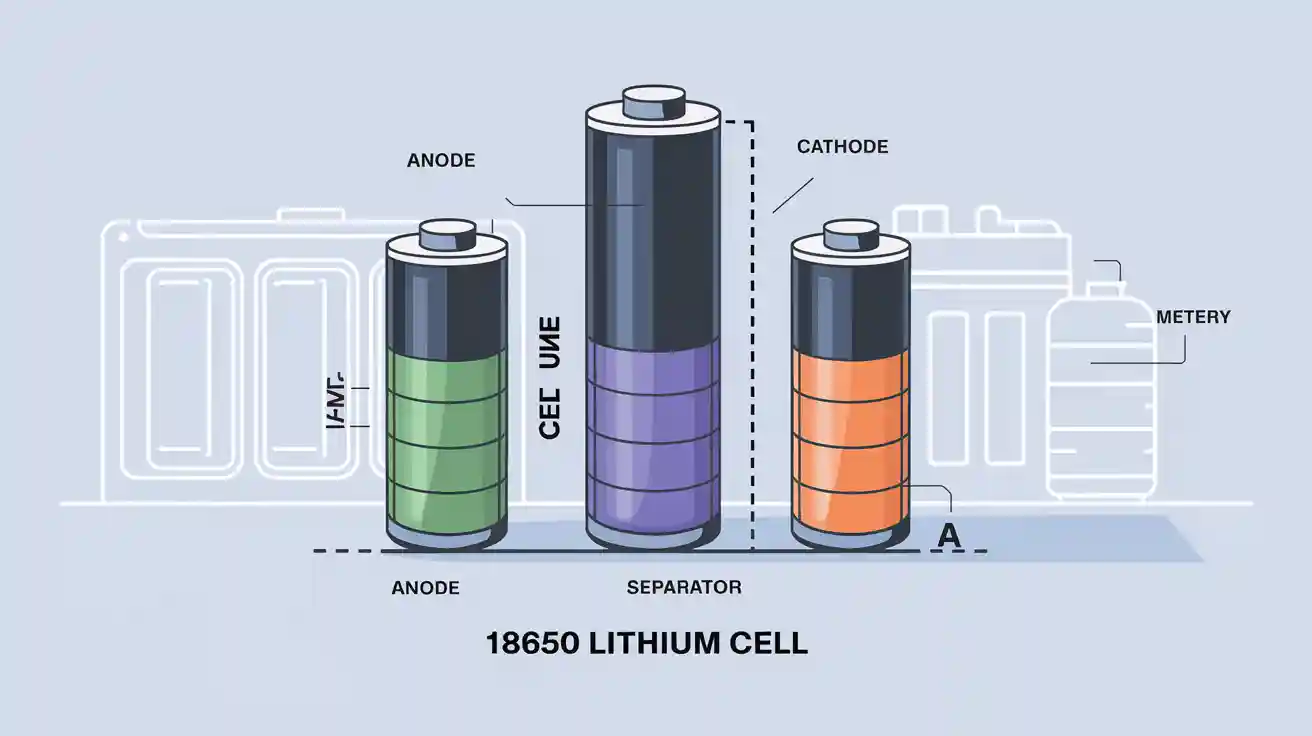
Définition en une phrase
An 18650 cell is a standardized cylindrical rechargeable battery, typically lithium-ion, measuring 18mm in diameter and 65mm in length, widely used in consumer, industrial, and mobility applications.
Explication détaillée
The term “18650” refers to the cell’s dimensions: 18mm in diameter and 65mm in length. This format is most commonly associated with lithium-ion chemistry, though other chemistries (such as LFP) are also available. The 18650 cell’s standardized size enables modular design and compatibility across a wide range of devices, from laptops and power tools to electric vehicles and industrial equipment. Its popularity stems from a balance of high energy density, robust safety features, and proven reliability over decades of use (Wikipedia (en anglais)).
Composants clés
- Cathode: Usually made from materials like NMC (Nickel Manganese Cobalt Oxide), NCA, LFP (Lithium Iron Phosphate), or LCO (Lithium Cobalt Oxide). Determines energy density and safety.
- Anode: Typically graphite, stores lithium ions during charging.
- Séparateur: A thin, porous membrane that prevents short circuits while allowing ion flow.
- Électrolyte: Facilitates lithium ion movement between anode and cathode.
- Metal Casing: Provides structural integrity and safety.
- Protection Circuit (optional): Some cells include a Battery Management System (BMS) for overcharge, over-discharge, and short-circuit protection.
Industrial and Real-World Applications
18650 cells are the backbone of many modern energy solutions:
- E-bikes & Electric Scooters: Powering lightweight mobility systems with high discharge rates and long cycle life.
- Outils électriques: Delivering burst current and rugged reliability for drills, saws, and more.
- Energy Storage Systems: Used in backup power, solar storage, and grid applications.
- Medical Devices & Industrial Equipment: Providing stable, certified power for sensitive and mission-critical applications.
- Smart Home & IoT Devices: Compact size and modularity make 18650 cells ideal for custom battery packs in smart locks, sensors, and portable electronics.
For B2B and industrial clients, custom 18650 battery packs can be engineered to specific voltage, capacity, and casing requirements, with advanced BMS integration and certifications such as UN38.3, CE, UL, and IEC 62133 (Junda Battery Compliance Guide).
International Standards and Certifications
To ensure safety, transportability, and market access, 18650 cells and battery packs must comply with key international standards:
- UN38.3: Mandatory for air and sea transport safety.
- CE: Required for EU market entry.
- UL (e.g., UL 2054/2271): U.S. consumer safety compliance.
- IEC 62133: Global safety standard for rechargeable cells.
- RoHS: Restricts hazardous substances in electronics.
High-quality manufacturers, such as Yungbang, ensure every 18650 cell and pack passes rigorous quality control and holds multiple certifications, supporting global B2B clients in sectors like smart home, industrial automation, and medical devices.
Chemistry Types: NMC vs. LFP and More
- NMC (Nickel Manganese Cobalt Oxide): High energy density, suitable for mobility and high-power tools.
- LFP (Lithium Iron Phosphate): Superior safety, long cycle life, ideal for energy storage and backup power.
- NCA, LCO: Used in specialized applications requiring specific performance traits.
For a detailed comparison of NMC and LFP chemistries, see CircuitDigest’s technical guide.
Concepts connexes
- Lithium-ion Battery: The broader category encompassing 18650 and other cell formats.
- Système de gestion de la batterie (BMS): Electronics that monitor and protect battery packs.
- Lithium Polymer (LiPo) & Prismatic Cells: Alternative formats with different shapes, energy densities, and use cases.
- 21700 Cellule: A newer, larger cylindrical format offering higher capacity.
Why Choose Yungbang for 18650 Solutions?
Yungbang specializes in the R&D, customization, and large-scale production of 18650 battery packs, supporting strict quality control and international certifications (ISO9001, ISO14001, UL, CE, UN38.3, etc.). With proven experience in B2B and industrial projects, Yungbang delivers tailored solutions for smart home, industrial, and medical applications worldwide.

